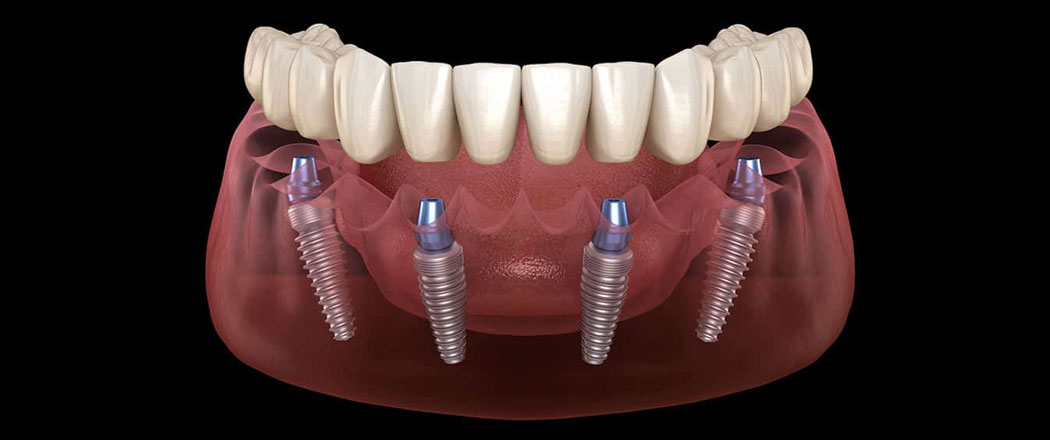Considering dental implants
Dental implants offer a welcome alternative to dentures or bridges.
Dental implants as a tooth replacement
Teeth are present in sockets of the jaw bone. When a tooth is removed, the surrounding bone collapses towards the pocket result in a decrease in the width and height of bone and wears away over time. A dental implant is a top choice for a tooth replacement. Like a healthy tooth, it absorbs and transmits forces to the surrounding tissues, thus maintaining bone levels.
Why dental implants are so popular?
A dental implant is one of the greatest inventions in dentistry in recent years. They became popular as they provide a natural look and comfortable fit. Long-lasting and reliable. High success rate. Especially young aspirants to replace missing natural teeth with implants significantly increased over the years.
How do implants work?
A dental implant is an artificial tooth root made of titanium that is surgically placed into your jaw bone. They aid in placing the artificial crown/ tooth. The implant fuses with the jaw bone, providing stable support for the artificial tooth.
What happens during the implant procedure?
A dental implant is usually done in two stages over a few months with healing between stages
It involves:
- Scans and x rays are required to visualize the surrounding bone support needed for implant placement.
- The first step involves placing the implant into the jaw bone by drilling the bone to make space for it.
- Wait for a few months while the bone grows around the dental implant.
- Once the implant is stable, the dentist creates a foundation for the new tooth.
- After some time, the impression is taken to make the artificial tooth.
- Finally, an artificial tooth is screwed or cemented into the foundation.
Advantages
Unlike natural teeth, implant material does not undergo corrosion or decay by the action of acid, sugar, and bacteria in the mouth. Even though being resistant to decay, implants still need to be maintained likewise natural teeth, the reason being they subjected to gum disease and bone loss around the implant if not thoroughly cleaned.
Bridge making, involves adjacent tooth grinding on both sides to act as an abutments/support through which the replaced artificial tooth is connected, acting as a bridge. On contrary, is an implant that functions as an individual support system without damaging adjacent natural tooth structure.
Benefits over the other alternatives
- Improved appearance.
- Improved comfort.
- Improved oral health: Dental implants don’t require reducing other teeth. Hence leaving the natural tooth intact. Better access between teeth to floss, improving oral hygiene.
- Improved self-esteem: Dental implants can give you back your pleasant smile, boosting your confidence.
- Convenience: dental implants eliminate the embarrassing inconvenience of removing dentures.
- Improved speech: with poor-fitting dentures teeth can slip within the mouth causing you to slur your words. Dental implants
fuse into the bone, don’t slip like the dentures. - Durability- Far better than another alternative.
- Solid support: dental implants provide a strong basement for partial or full mouth dentures, decreasing the pressure of soft tissues (gums).
- Easier eating: dental implants acts as a natural tooth increasing chewing efficiency.
The entire surface of traditional dentures relies on underlying gums for their support, thus during the process of chewing pressure is applied more on gums compared to the natural teeth or an implant. This eventually results in marked wear of bone. Unlike denture, implant transfer the pressure applied to the surrounding bone preventing bone resorption and provide a strong foundation for the denture. In some cases, the denture will never touch the gums because it is connected to the implant. In many cases, implants are used to anchor partial or complete dentures, providing increased strength, retention, and stability.
Are dental implants noticeable?
No one can make out you have an implant. That’s the miracle. Implants are made to feel completely natural in the mouth. The dentist matches the color and shape of your other teeth to the implant for the perfect match. The only way to discover the dental implant involves a radiograph to show the metal that replaced the root of the
How do I care for dental implants?
Despite being resistant to cavities, implants still need to be maintained as if they are natural teeth because they are subject to gum disease and bone loss around the implant if not properly cleaned.
How long dental implant last?
Implants can function for a long time if you take care properly. They often last long in patients with regular brushing, floss, and follow regular dental visits. Dentists can provide guidelines for better care of your teeth based on proper hygiene, genetic history, and nutritional habits. Following recommendations properly implant has the best chance to last for a lifetime.
How do I know if I am eligible for dental implants?
In general, you are the candidate for dental implants if:
- One or more missing teeth
- Sufficient bone to receive implants
- Jaw bone reached full growth
- Healthy oral tissues
- Unwilling for dentures




